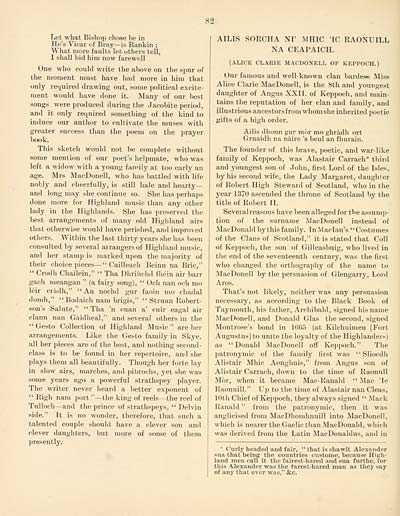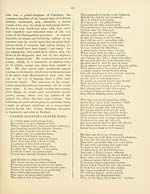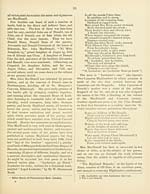Download files
Complete book:
Individual page:
Thumbnail gallery: Grid view | List view

Let what Bishop chose be in
He's Vicar of Bray— is Rankin ;
What more faults let others tell,
I shall bid him now farewell
One who could write the above on the spur of
the moment must have had more in him that
only required drawing out, some political excite-
ment would have done it. Many of our best
songs were produced during the Jacobite period,
and it only required something of the kind to
induce our author to cultivate the muses with
greater success than the poem on the prayer
book.
This sketch would not be complete without
some mention of our poet's helpmate, who was
left a widow with a young fannly at too early an
age. Mrs MacDonell, who has battled witli life
nobly and cheerfully, is still hale and hearty—
and long may she continue so. She has jjerhaps
done more for Highland music than any other
lady in the Highlands. She has preserved the
best arrangements of many old Highland airs
that otherwise would have perished, and improved
others. Within the last thirty years she has been
consulted by several airangersof Highland music,
and her stamp is marked upon the majority of
their choice pieces—" Cailleach Beinn na Brie,"
" Crodh Chailein," " Tha Dhriiichd fhein air barr
gach meangan " (a fairy song), " Och nan och mo
leir cràdh," "An nochd gur faoin mo chadal
domh," " Bodaich nam brigis," " Struan Robert-
son's Salute," "Tha 'n cuan a' cuir eagal air
clann nan Gàidheal," and several others in the
" Gesto Collection of Highland Music " are her
arrangements. Like the Ges^to family in Skye,
all her pieces are of the best, and nothing second-
class is to be found in her repertoire, and she
plays them all beautifully. Though her forte lay
in slow airs, marches, and pibrochs, yet she was
some years ago a powerful strathspey player.
The writer never heard a better exponent of
" Righ nam port "—the king of reels— the reel of
Tulloch— and the prince of strathspeys, " Delvin
side." It is no wonder, therefore, that such a
talented couple should have a clever son and
clever daughters, but more of some of them
presently.
AILIS SORCHA NI' MHIC 'IC RAONUILL
NA CEAPAICH.
(ALICE CLARIE MACDONELL OF KEPPOCH.)
Our famous and well-known clan bardese Miss
Alice Clarie MacDonell, is the 8th and j'oungest
daughter of Angus XXII. of Keppoch, and main-
tains the reputation of her clan and family, and
illustrious ancestorsf rom whom she inherited poetic
gifts of a high order.
Ailis dhonn gur niòr mo ghràdh ort
Gruaidh na nàire 's beul an fhurain.
The founder of this brave, poetic, and war-like
family of Keppoch, was Alastair Carrach* third
and youngest son of John, first Lord of the Isles,
by his second wife, the Lady Margaret, daughter
of Robert High Steward of Scotland, who in the
year 1370 ascended the throne of Scotland by the
title of Robert II.
Several reasons have been alleged for the assump-
tion of the surname MacDonell instead of
MacDonald by this family. In Maclan's "Costumes
of the Clans of Scotland," it is stated that Coll
of Keppoch, the son of Gilleasbuig, who lived in
the end of the seventeenth century, was the first
who changed the orthography of the name to
MacDonell by the persuasion of Glengarry, Lord
Aros.
That's not likely, neither was any persuasion
necessary, as according to the Black Book of
Taymouth, his father, Archibald, signed his name
MacDonell, and Donald Glas the second, signed
Montrose's bond in 1665 (at Kilchuimen [Fort
Augustus] to unite the loyalty of the Highlanders)
as "Donald MacDonell off Keppoch." The
patronymic of the family first was " Sliocdh
Alistair Mhic Aonghuis," from Angus son of
Alistair Carrach, down to the time of Raonull
Mùr, when it became Mac-Ranald " Mac 'Ic
Raonuill." Up to the time of Alastair nan Cleas,
10th Chief of Keppoch, they always signed " Mack
Ranald " from the patronymic, then it was
anglicised from MacDhomhnuill into MacDonell,
which is nearer the Gaelic than MacDonald, which
was derived from the Latin MacDonaldus, and in
* Curly headed and fair, " that is shawit Alexander
sua that being the countries custome, because High-
land men call it the fairest-hared and sna furthe, for
this A.lexander was the farest-hared man as they say
of any that ever was," &c.
He's Vicar of Bray— is Rankin ;
What more faults let others tell,
I shall bid him now farewell
One who could write the above on the spur of
the moment must have had more in him that
only required drawing out, some political excite-
ment would have done it. Many of our best
songs were produced during the Jacobite period,
and it only required something of the kind to
induce our author to cultivate the muses with
greater success than the poem on the prayer
book.
This sketch would not be complete without
some mention of our poet's helpmate, who was
left a widow with a young fannly at too early an
age. Mrs MacDonell, who has battled witli life
nobly and cheerfully, is still hale and hearty—
and long may she continue so. She has jjerhaps
done more for Highland music than any other
lady in the Highlands. She has preserved the
best arrangements of many old Highland airs
that otherwise would have perished, and improved
others. Within the last thirty years she has been
consulted by several airangersof Highland music,
and her stamp is marked upon the majority of
their choice pieces—" Cailleach Beinn na Brie,"
" Crodh Chailein," " Tha Dhriiichd fhein air barr
gach meangan " (a fairy song), " Och nan och mo
leir cràdh," "An nochd gur faoin mo chadal
domh," " Bodaich nam brigis," " Struan Robert-
son's Salute," "Tha 'n cuan a' cuir eagal air
clann nan Gàidheal," and several others in the
" Gesto Collection of Highland Music " are her
arrangements. Like the Ges^to family in Skye,
all her pieces are of the best, and nothing second-
class is to be found in her repertoire, and she
plays them all beautifully. Though her forte lay
in slow airs, marches, and pibrochs, yet she was
some years ago a powerful strathspey player.
The writer never heard a better exponent of
" Righ nam port "—the king of reels— the reel of
Tulloch— and the prince of strathspeys, " Delvin
side." It is no wonder, therefore, that such a
talented couple should have a clever son and
clever daughters, but more of some of them
presently.
AILIS SORCHA NI' MHIC 'IC RAONUILL
NA CEAPAICH.
(ALICE CLARIE MACDONELL OF KEPPOCH.)
Our famous and well-known clan bardese Miss
Alice Clarie MacDonell, is the 8th and j'oungest
daughter of Angus XXII. of Keppoch, and main-
tains the reputation of her clan and family, and
illustrious ancestorsf rom whom she inherited poetic
gifts of a high order.
Ailis dhonn gur niòr mo ghràdh ort
Gruaidh na nàire 's beul an fhurain.
The founder of this brave, poetic, and war-like
family of Keppoch, was Alastair Carrach* third
and youngest son of John, first Lord of the Isles,
by his second wife, the Lady Margaret, daughter
of Robert High Steward of Scotland, who in the
year 1370 ascended the throne of Scotland by the
title of Robert II.
Several reasons have been alleged for the assump-
tion of the surname MacDonell instead of
MacDonald by this family. In Maclan's "Costumes
of the Clans of Scotland," it is stated that Coll
of Keppoch, the son of Gilleasbuig, who lived in
the end of the seventeenth century, was the first
who changed the orthography of the name to
MacDonell by the persuasion of Glengarry, Lord
Aros.
That's not likely, neither was any persuasion
necessary, as according to the Black Book of
Taymouth, his father, Archibald, signed his name
MacDonell, and Donald Glas the second, signed
Montrose's bond in 1665 (at Kilchuimen [Fort
Augustus] to unite the loyalty of the Highlanders)
as "Donald MacDonell off Keppoch." The
patronymic of the family first was " Sliocdh
Alistair Mhic Aonghuis," from Angus son of
Alistair Carrach, down to the time of Raonull
Mùr, when it became Mac-Ranald " Mac 'Ic
Raonuill." Up to the time of Alastair nan Cleas,
10th Chief of Keppoch, they always signed " Mack
Ranald " from the patronymic, then it was
anglicised from MacDhomhnuill into MacDonell,
which is nearer the Gaelic than MacDonald, which
was derived from the Latin MacDonaldus, and in
* Curly headed and fair, " that is shawit Alexander
sua that being the countries custome, because High-
land men call it the fairest-hared and sna furthe, for
this A.lexander was the farest-hared man as they say
of any that ever was," &c.
Set display mode to: Large image | Transcription
Images and transcriptions on this page, including medium image downloads, may be used under the Creative Commons Attribution 4.0 International Licence unless otherwise stated. ![]()
| Early Gaelic Book Collections > Ossian Collection > Macdonald bards from mediaeval times > (92) |
|---|
| Permanent URL | https://digital.nls.uk/80461505 |
|---|
| Description | Selected books from the Ossian Collection of 327 volumes, originally assembled by J. Norman Methven of Perth. Different editions and translations of James MacPherson's epic poem 'Ossian', some with a map of the 'Kingdom of Connor'. Also secondary material relating to Ossianic poetry and the Ossian controversy. |
|---|
| Description | Selected items from five 'Special and Named Printed Collections'. Includes books in Gaelic and other Celtic languages, works about the Gaels, their languages, literature, culture and history. |
|---|

